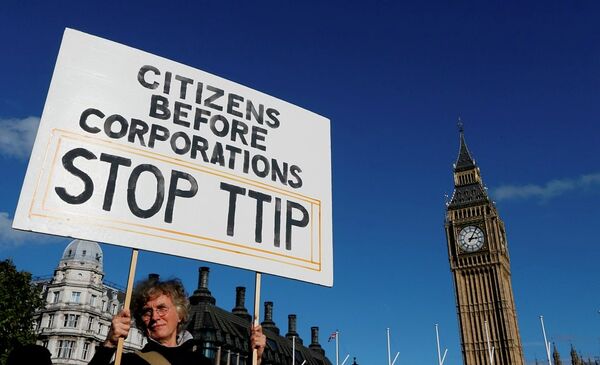Campaign groups have long condemned the secrecy behind the talks to agree the TTIP, which they believe would hand huge powers to big businesses and make capitalism more powerful than democracy. Lawmakers in the European Parliament started legal action against the EU in an effort to gain access to documents pertaining to the talks — many of which have been behind closed doors and involved well-funded lobby groups on behalf of big business.
More evidence of the secrecy surrounding #TTIP and other similar trade deals. And yes — we're angry! #noTTIP https://t.co/3DrY5iKhxd
— Global Justice Now (@globaljusticesc) January 27, 2016
At the heart of the issue is regulation — of the food people put in their mouths, the air that they breathe, the safety of pharmaceuticals and the protection of people and workers' rights. One of the most controversial issues is the Investor State Dispute Settlement (ISDS) tribunal system, under which a private company can sue a government if that state's regulatory system prevents the sale of its profits causing loss of profits.

Critics believe the use of the ISDS tribunal system avoids sovereign states' own judicial systems, creating an effective court above the law. Many in Europe believe there is a huge deal of difference between the regulatory systems in the US and those in the EU, and that US pressure will lead to looser regulation of the health and industries in particular, because governments will fear being sued for billions of dollars under the ISDS.
'Extreme Secrecy'
In the UK, campaigners trying to gain access to legal documents concerning the extent to which private health companies could sue the government have been snubbed after Business Secretary Sajid Javid refused a freedom of information request, saying that disclosing the legal documents would make civil servants cautious when they "need space in which to seek candid advice from their lawyers."
EU Ambassador says EU-Canada free trade deal may become law without UK parliamentary debate https://t.co/9DslwfqbNp pic.twitter.com/4oWxTVgIsi
— Global Justice Now (@GlobalJusticeUK) January 23, 2016
"Sadly it's not surprising that the government is choosing to block access to TTIP documents when the whole process has been shrouded in such secrecy.
"Politicians are constantly telling the public that there is nothing to be concerned about, but then go to great lengths to prevent any sort of public scrutiny as to the nature of the negotiations," Nick Deaden, director of Global Justice Now, told Sputnik Wednesday.
"While business lobby groups have had numerous meetings with members of the European Commission to set out what they want from the deal, ordinary people with very real concerns about protecting public services, the environment and consumer standards, are being systematically shut out.
"Even MEPs have found it very difficult to get access to relevant documents. The extreme secrecy surrounding TTIP is one of many pieces of evidence that this is a corporate charter being cooked up behind closed doors to the detriment of democracy and the interests of ordinary people in the EU," Deaden told Sputnik.




